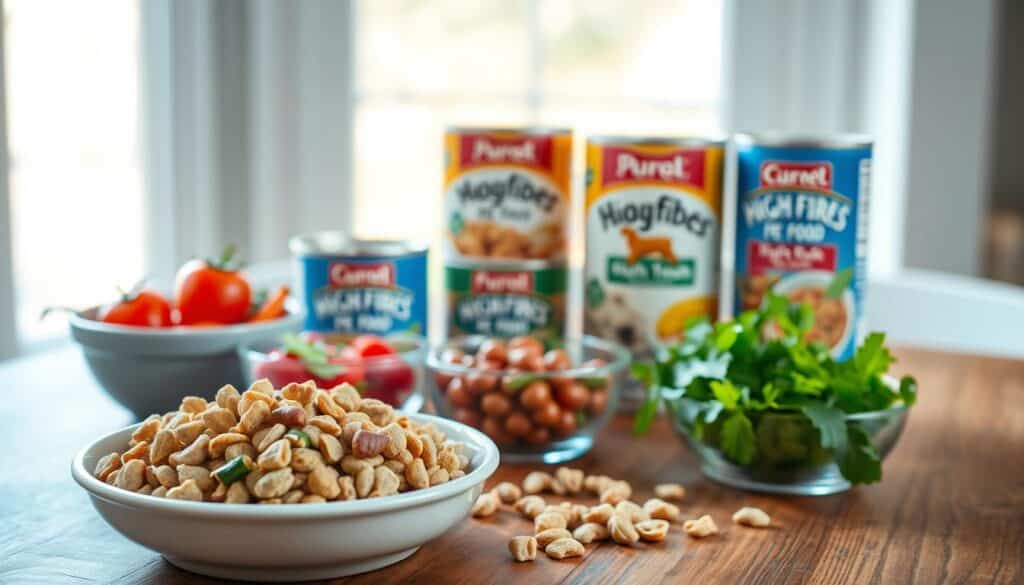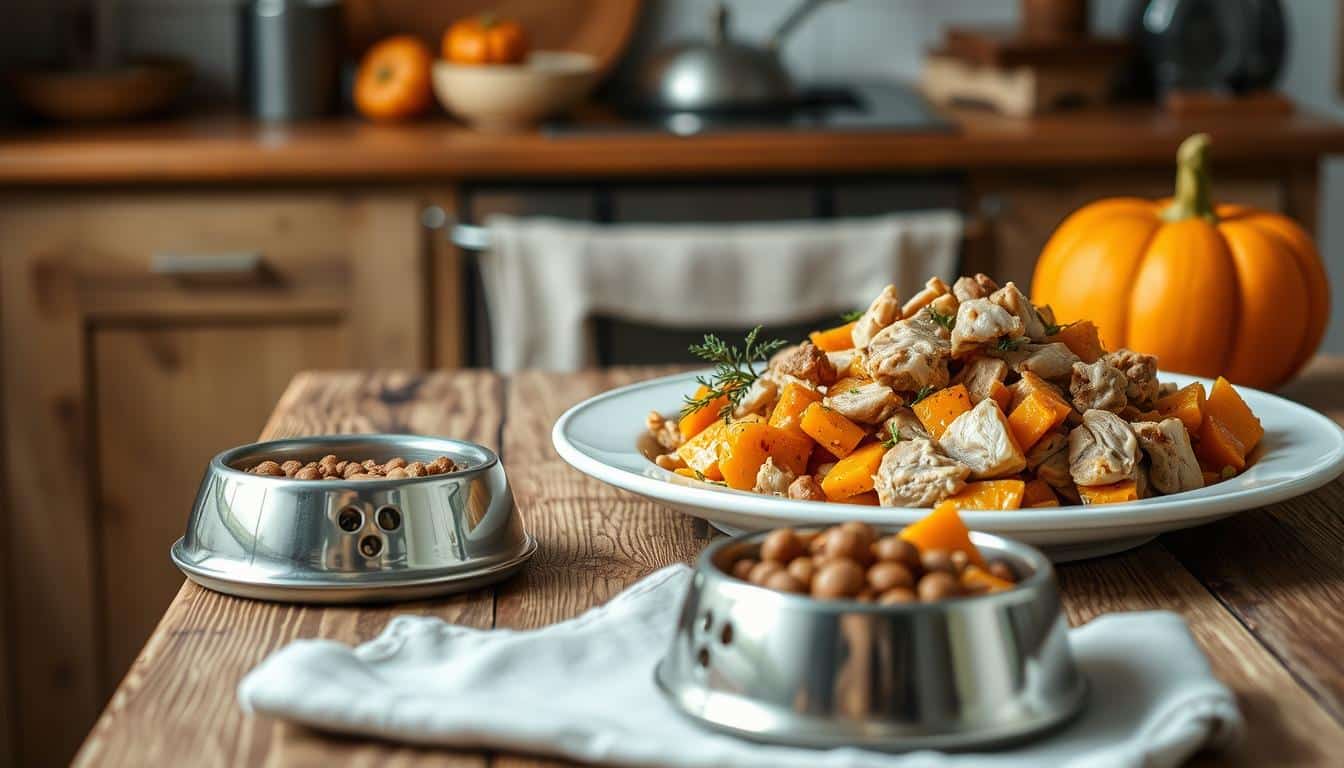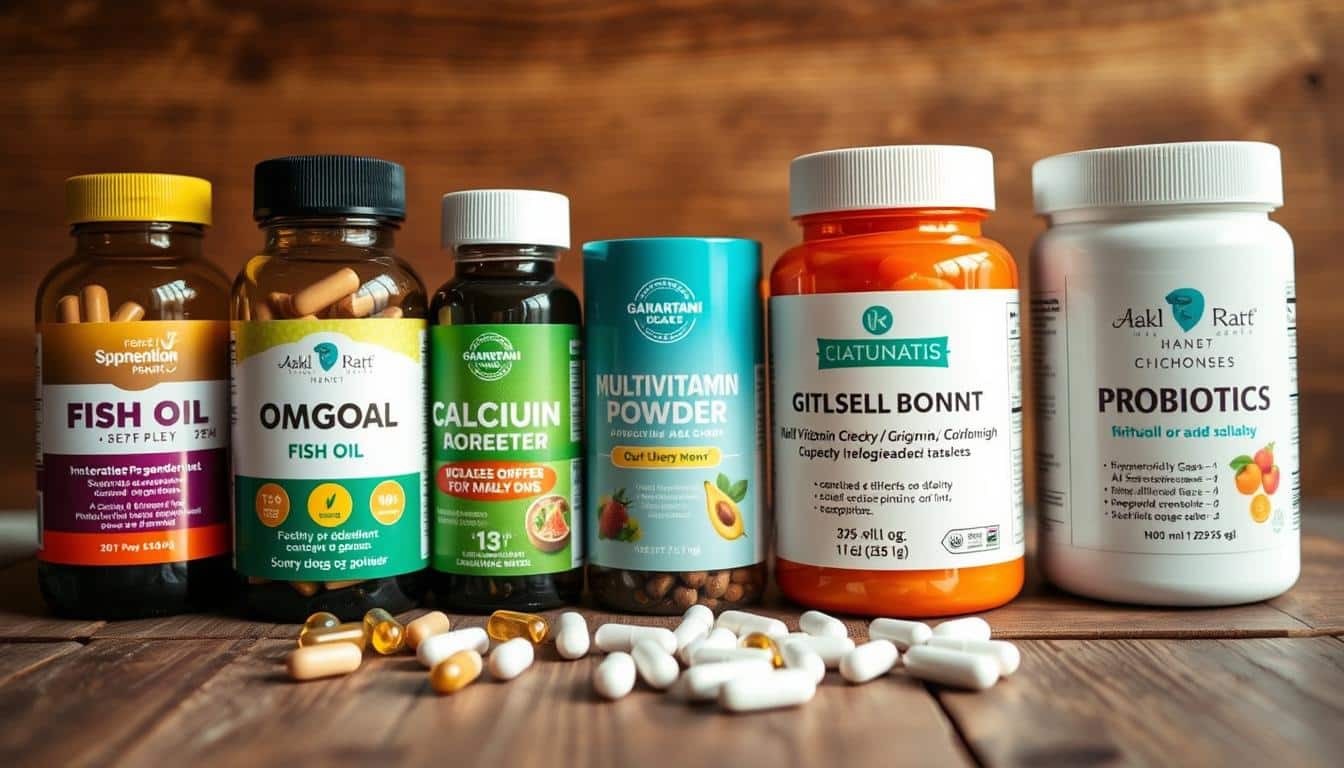Small dogs and puppies sometimes get mildly constipated. Older pets often have this problem more. Look for signs like less poop, struggling to go, and hard, dry stools. A diet aimed at relieving constipation can help at home.
Try adding pumpkin, canned wet food, and plain bone broth to their meals. These add moisture and fiber. They’re also easy to find and affordable.
Along with new food, short walks and eating on a schedule help keep things moving. If your dog hasn’t pooped in 48–72 hours, or seems in pain, vomiting, or very tired, see a vet.
We’ll share recipes safe for small dogs, how to figure out how much to feed them, and when to use vet-recommended supplements or medicines.
Understanding Constipation in Small Breeds: Signs and Causes
Small dogs may not show it right away when they have trouble digesting their food. Owners usually notice odd behaviors before seeing any clear health problems. Recognizing the early signs can help you take quicker action and ease your pet’s discomfort.
How constipation presents in small dogs
Keep an eye on how often your dog goes to the bathroom. Not pooping for more than 48 hours is a warning sign.
It’s common for them to try hard but only produce small, hard stools. These dry stools mean the dog might be dehydrated or the food is moving too slowly. Some dogs might even make noises if their belly hurts or when trying to poop.
Look out for other signs, too, like dragging their bottom, eating less, throwing up, seeming uneasy, or belly aches. Dogs might try to poop and nothing comes out. This could be confused with diarrhea. It’s important to keep an eye on how often they go and what their poop looks like. This helps you explain things better to the vet.
Common causes specific to small breeds
What they eat is really important. Foods low in fiber or made mostly of fillers can slow down their bowel movements. Not drinking enough water makes it worse.
- Not drinking enough water or dehydration
- Eating low-fiber, low-quality food
- Not getting enough exercise, especially in older dogs
- Swallowing things they shouldn’t, like hair, grass, or small toys
- Problems with their anal sacs, side effects from medicine, or other health issues like a bad thyroid, big prostate, tumors, or spine issues
Old dogs of small breeds are more at risk because their digestion and movement slow down. This can make it hard for them to squat and poop, leading to more troubles with constipation.
If your small dog keeps having trouble going to the bathroom, or if you think there’s a blockage, see a vet. Waiting more than 48 hours without a bowel movement, vomiting a lot, bad belly pain, or really low energy could mean a serious blockage that needs quick help.
Why Fiber Matters: Soluble and Insoluble Fiber for Digestive Health
Fiber is key to easing constipation and keeping small dogs comfortable. It’s a mix of soluble and insoluble types that shapes stool, supports gut movement, and feeds good bacteria. Owners of small breeds should carefully manage food amounts and make dietary changes slowly to avoid upsetting their dog’s stomach.
Role of soluble fiber
Soluble fiber turns into a soft gel in the gut by absorbing water. Foods like pumpkin, peeled apples, and cooked carrots keep moisture in stool, making it softer. Adding just the right amount of this fiber type helps keep bowel movements regular without making the stool too bulky.
Role of insoluble fiber
Insoluble fiber bulks up stool and gets the intestines moving to clear waste. Beet pulp, green beans, and a little brown rice promote this action. But, giving too much of it without enough water can lead to dry, hard stool, which is a no-go for small dogs.
Balancing fiber for small breeds
Strive for a balanced diet that includes both soluble and insoluble fibers. Introduce new fiber types gradually over a week or more and keep an eye on stool consistency. Increase fiber along with moisture sources like wet food or water to avoid constipation.
- Start with small amounts of prebiotic fibers like inulin or flaxseed to boost gut health and bowel function.
- Think about adding a probiotic to help small breeds with digestive health when needed.
- Adjust food portions to the dog’s size and go easy on high-fiber foods for tiny dogs.
High-Fiber Whole Foods Safe for Small Dogs
Choosing whole foods helps relieve mild constipation in small breeds while keeping meals natural and simple. Serve small portions suitable for a toy or small terrier’s calorie needs. Watch their stool, weight, and appetite when you start them on new foods.
Pumpkin puree as a top gentle laxative
Start small dogs off with one teaspoon of 100% plain canned pumpkin per 10 pounds of body weight. Pumpkin supplies soluble fiber and moisture to soften stool and ease its passage. Remember, use only plain pumpkin, not the spiced pie filling, and adjust the amount for smaller breeds.
Vegetables and fruits to add
Adding cooked carrots, steamed green beans, and a little spinach can introduce gentle bulk and vitamins. Offer slices of apple with no core or seeds and some berries for their fiber and antioxidants. These safe fruits and vegetables make great low-calorie extras when given in small portions.
Beetroot pulp is very high in fiber and can aid some dogs, but beware it might stain stools and furniture. Start beet pulp products slowly and keep an eye on any changes in stool color and texture.
Whole grains and fiber-rich carbs
Cooked brown rice and mashed sweet potatoes are good sources of digestible insoluble and soluble fiber. Brown rice is usually in high-fiber recipes for sensitive stomachs. Be sure to control portions to avoid weight gain and skip canned veggies with added salt.
- Serve whole foods in small, measured portions.
- Limit fruit to avoid excess sugar for tiny dogs.
- Prefer fresh or lightly steamed vegetables over salted canned options.
Sample High-Fiber Meal Plans for Constipated Small Breeds
Here are easy, day-to-day meal ideas mixing whole foods, precise amounts of pumpkin, and added water. These meals are perfect for small dogs, helping them pass stools more comfortably while keeping their calorie intake right. Adjust the food amounts based on your dog’s weight and watch their stool for 7–10 days.
Morning meal idea
Begin with a bit of high-quality kibble or some gently cooked lean turkey. Include 1 teaspoon of pure pumpkin, just right for small dogs, for better regularity. Add in 1 teaspoon of plain Greek yogurt for a touch of probiotics or a bit of coconut oil if your dog likes it. Top it off with some low-sodium bone broth or warm water to increase moisture and help with digestion.
Evening meal idea
Give a small amount of cooked sweet potato (about 1 tablespoon for tiny dogs) and some steamed green beans. Throw in a small piece of lean chicken or turkey for protein. Add a bit of bone broth to soften the meal and boost hydration. This mix has both soluble and insoluble fiber, and it’s easy on delicate stomachs.
Snack and topper suggestions
- Apple slices without core or seeds, cut small for safety.
- Carrot sticks, raw or lightly cooked, as a crunchy fiber treat.
- A tiny spoon of coconut or olive oil used sparingly as a stool softener; increase slowly to avoid loose stools.
- Vet-approved organic fiber powder or dog-specific prebiotic supplement when whole-food fixes aren’t enough; follow product dosing and your veterinarian’s advice.
If your dog continues to have problems, think about setting up a constipation meal plan with your vet’s help. Adding measured pumpkin and plenty of liquids makes these high-fiber meals more helpful. Keep an eye on how often and what your dog’s stools look like, and adjust fiber or water gradually to avoid stomach issues.
Hydration and Fats: Supporting Fiber with Moisture and Lubrication
To make a constipated small dog feel better, mix fiber with lots of fluids and soft fats. Proper moisture makes fiber expand and move. Light oils help by making the stool slippery. These are easy steps to aid bowel movement without upsetting the stomach.
Importance of hydration
Always have fresh water ready. Small dogs may not drink much at once. So, put several bowls around your home and where they sleep. A pet fountain or filtered water might get them to drink more.
Make their meals wetter by adding dog-friendly, low-sodium bone broth, warm water, or mushy canned food. Canned pumpkin also adds water and makes stools softer. If your dog isn’t drinking enough or seems dehydrated, offer electrolyte snacks. For long-term problems, it’s best to see a vet.
Healthy oils as mild laxatives
Use oils like coconut, olive, and fish as a quick fix. They can make stools easier to pass and taste better. For small dogs, start with 1 teaspoon of coconut oil in their food. Then, see how they react and adjust.
Be aware of side effects. Too much fat can cause diarrhea or pancreatitis, especially in sensitive dogs. Always check with your vet before giving oils, especially if your dog has had pancreas or digestion problems.
- Try bone broth for dogs as a moisture-rich topper; choose low-sodium varieties.
- Use oils for dog constipation sparingly and track stool quality.
- Combine hydration, moisture-rich meals, and light fats to support fiber action.
Supplements and Gut Support: Probiotics, Fiber Powders, and Yogurt
When small dogs have trouble with their stools, certain supplements can help speed up their recovery. Always start with advice from your vet, and make sure your pet drinks more water. Here are some useful tips on probiotics, fiber powders, and a safe yogurt option for your dog.
When to use probiotics
Give your dog probiotics for constipation if they’re often having trouble, after antibiotics, or if the vet finds their gut bacteria is out of balance. Pick probiotics made for dogs from trusted brands like Purina Pro Plan Veterinary Supplements or Nutramax Pet Health.
Start with the smallest dose suggested by the manufacturer and watch how your dog’s stool changes for a few days. If your dog gets diarrhea or things get worse, stop using it and talk to your vet about other options or medications like cisapride.
Fiber supplements and dosing for small breeds
Fiber powders can help fix your dog’s stool problems, whether it’s too hard or too loose. Choose organic psyllium mixes or vet-recommended fiber blends that also include prebiotics and postbiotics.
- Always stick to the directions on the package. For small dogs, start with the smallest dose.
- Have a chat with your vet about how much fiber to give your small dog before you start. Increasing the dose slowly over days can help avoid gas and stomach aches.
- Keep your dog well-hydrated and mix the fiber with wet food to avoid making constipation worse.
Safe dairy option: plain Greek yogurt
Adding plain, unsweetened Greek yogurt to your small dog’s meals can provide beneficial live cultures and a bit of moisture. Begin with 1 teaspoon for very small dogs, or 1 tablespoon for larger ones within the small breed category.
Stay away from flavored yogurts or those with xylitol. If your dog can’t handle lactose, stop giving them yogurt and talk to your vet about other probiotic treats or supplements.
Lifestyle Measures: Exercise, Routine, and When to Seek Veterinary Care
Small dogs feel better with simple changes that boost bowel health. Taking them for short, daily activities and giving meals at regular times can make going to the bathroom easier. Also, keep an eye out for any quick changes in their health.
Daily exercise and bowel stimulation
- Walking a bit after eating helps start digestion. Try for two to three short walks each day, thinking about the dog’s age and joint health.
- Playing can also help with bowel movements. For older dogs, gentle play like tug-of-war or finding hidden toys indoors is good.
- Mixing exercise with regular potty breaks helps with their natural schedule and makes going less difficult.
Consistent feeding schedules
- Eating at the same time every day helps with their digestion cycle. This makes their bathroom times more predictable.
- Having small, specific meal portions can stop overeating and keep their digestion moving.
- Start giving fiber supplements or pumpkin at a consistent time to see how it changes their stool.
Warning signs needing immediate veterinary attention
- If there’s no bowel movement for over 48 hours, vomiting, severe stomach pain, or a swollen belly, get urgent care.
- Look out for other worries like weakness, not eating, not drinking enough water, bending over, crying, or blockages from eating something they shouldn’t have.
- Problems like anal sac issues or continuous pain when going need a vet’s help.
- If constipation doesn’t go away or is related to losing weight, changes in peeing, walking weird, or nerve issues, see a vet. They might discover thyroid, spine problems, prostate issues, or tumors that need special treatment.
If simple steps don’t work, see a vet without delay. An early check-up can stop worse problems and help create a custom care plan. This might include special diets, medicine, or tests if necessary.
Ingredients and Foods to Avoid for Constipated Small Breeds
Owners of small breeds must watch out for certain ingredients. These can slow down digestion or make stools hard. Steer clear of unclear fillers lacking in nutrition.
Problematic fillers and processed ingredients
Stay away from lower quality dog foods filled with corn, soy, and wheat gluten. These foods often contain artificial preservatives like BHA, BHT, and ethoxyquin that harm digestion. Such items usually show up in cheaper dog food brands, slowing down digestion over time.
- Avoid foods with “natural flavors” or many by-products listed.
- Limits foods high in fillers but low in fiber and moisture.
Human foods to skip
Some human foods are bad for dogs’ digestive systems. For example, pumpkin pie filling has sugar and spices that harm digestion. The cores and seeds of fruits can be toxic or block the intestines. And xylitol, found in many treats, is very toxic to dogs.
- Never give dogs gum, sugar-free spreads, or anything with xylitol.
- Steer clear of fatty leftovers and sweets that can slow digestion.
Caution with excess calcium and bones
Giving dogs bones or too much calcium may cause hard, dry stools and could lead to blockages. Cooked bones can break into sharp pieces, posing a serious risk. Always talk to a vet before feeding your small dog bones or calcium supplements.
- Avoid cooked bones or a lot of raw bone without asking a vet first.
- Be careful with supplements rich in calcium as they can make stools tougher.
When switching your dog to a diet with more fiber, watch out for sneaky additives in food toppers and treats. Stay away from toxic items like xylitol, and remember, bones might cause constipation. Always be vigilant about what goes into your dog’s meals to avoid making constipation worse.
High-fiber meals for constipated small breeds
Creating balanced, gentle meals helps relieve constipation without upsetting a small dog’s stomach. Use modest portions and simple ingredients. Check stools and energy as you adjust recipes.

Practical portioning and examples
Scale toppers to body weight. For a typical small-breed mix bowl try:
- 1–2 oz lean cooked turkey
- 1 tsp pure canned pumpkin
- 1 tbsp cooked sweet potato
- 1–2 tsp low-sodium bone broth
Reduce amounts for toy breeds. For a 6–8 lb dog, halve the turkey and pumpkin. Add a pinch of oat bran or a small spoon of canned green beans for extra fiber.
Transitioning diets safely
Make changes gradually over 7–10 days to avoid GI upset. Start with 10% new food on day one. Then increase each day until fully transitioned.
Monitor stool quality daily. If stools get too firm, add more broth or water. If they get loose, reduce fiber a bit and reassess in 48 hours.
When a specialized diet is needed
If constipation persists, talk to your vet. Brands like Hill’s Prescription Diet w/d and Royal Canin are often recommended for chronic cases.
A vet-prescribed fiber diet may be necessary when dealing with things like megacolon or hypothyroidism. Older small breeds, especially those with health issues, need long-term plans made with a vet.
Conclusion
Dealing with constipation in small dogs can be straightforward. Focus on meals rich in balanced fiber, ensure they stay hydrated, and incorporate light fats. Foods like plain canned pumpkin, cooked veggies, and brown rice are great. They help fix constipation in small dogs. Just be sure to adjust the portions for their size and mix it into their usual meals.
If whole foods aren’t enough, try dog-specific probiotics or fiber supplements. When changing diets, do so gradually over a week to ten days to prevent tummy troubles. Keep an eye on your dog’s stool quality every day. Be prepared to use healthy oils and regular exercise to help your dog go to the bathroom.
If your dog hasn’t had a bowel movement in over two days or shows signs of pain, throwing up, or low energy, it’s time to see a vet. Sometimes, chronic constipation requires a special diet or tests. The key takeaway is to create a care plan with your vet. This helps keep your small-breed friend feeling good and regular.
FAQ
What is constipation in small-breed dogs and how does it differ from withholding stool?
What signs should make me worry and call my veterinarian?
What common causes of constipation affect small breeds?
How can fiber help, and what’s the difference between soluble and insoluble fiber?
Can too much fiber make constipation worse?
Is plain canned pumpkin safe and how much should I give a small dog?
What whole foods are safe high-fiber additions for small dogs?
Which foods and ingredients should I avoid when treating constipation at home?
How can I increase hydration to help a constipated small dog?
Are oils or fats useful for constipation?
When should I use probiotics or fiber supplements?
Is plain Greek yogurt a good option?
How should I feed a constipated small dog across a day? Any sample meals?
How do I transition to a higher-fiber diet safely?
What lifestyle changes can help prevent constipation?
When is a prescription diet or medication necessary?
Can anal sac problems cause constipation?
How do I monitor progress and know if home care is working?
Are there special considerations for older small-breed dogs?
What are safe commercial products to consider?
Content created with the help of Artificial Intelligence.



